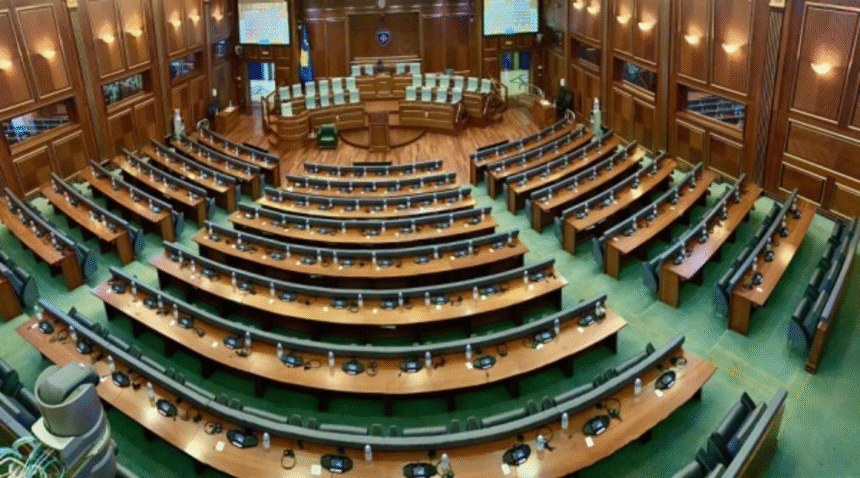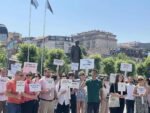Kosovo risks falling behind in the race for millions of euros from the European Union, while its neighbors have already begun to benefit.
The political deadlock following the most recent parliamentary elections is costing the country access to millions of euros from the EU’s Growth Plan for the Western Balkans.
This €6 billion package was approved in late 2023.
The distribution of the funds was initially planned to begin at the end of last year, but it has been delayed for several months.
On June 21, Serbia became the latest country—after North Macedonia, Albania, and Montenegro—to announce it had received its first installment from the EU, amounting to €51.66 million.
Bosnia and Herzegovina has yet to submit the required Reform Agenda to EU authorities.
Kosovo’s issue is different: the country still does not have a constituted Parliament to ratify the necessary agreement for accessing the funds.
Such agreements are considered international in nature and, as such, require ratification by two-thirds of parliamentary votes.
Despite numerous attempts, MPs had failed to constitute the Parliament as of June 25.
Observers are urging them to put internal disputes aside in order to seize an opportunity that could directly impact the country’s EU path and economic development.
“Why is this important today? Because if Kosovo has the latest head start compared to other countries, it means you’ll always be one step behind,” said Demush Shasha from the Kosovo Institute for European Policy.
Under the Growth Plan, which covers the period from 2024 to 2027, Kosovo could receive more than €880 million.
Over €250 million would come as grants, while the rest would be provided as favorable loans.
The pre-financing portion (7%), which has already been disbursed to four Balkan countries, would amount to about €61 million for Kosovo.
These funds aim to help align the six regional economies with that of the EU — an organization all of them hope to join.
However, countries have been warned that if they fail to meet required reforms within one to two years — including developing the private sector, green transition, and digitalization — their allocated amounts may be redistributed to other countries.
Is there a deadline to ratify the agreement?
Radio Free Europe asked the European Union whether there was a deadline for Kosovo to ratify the relevant agreement in order to receive pre-financing, but received no response by the time of publication.
Sources within Kosovo’s outgoing government told RFE that there is no such deadline.
Shasha echoed that view. According to him, the pre-financing is not directly at risk from the ratification delay, but this initial delay could cause a chain reaction of consequences, affecting Kosovo’s ability to meet the conditions set by the EU for 2025 and the two years that follow.
These conditions include progress in reforms and constructive dialogue with Serbia for the normalization of relations.
“All of this could delay Kosovo’s progress during the 2025–2027 period and put it in a position where it cannot utilize its allocated funds from the Growth Plan. The funds Kosovo fails to use will be redistributed to other countries,” Shasha said, referring to EU Growth Plan documents.
He added that such delays also send the wrong message regarding Kosovo’s readiness to advance toward the EU.
“It is not good for Kosovo’s international or European prestige to behave, appear, or be perceived in this way — as a regional actor in the integration process that cannot keep pace with the rest of the region,” Shasha told RFE.
Among the six Western Balkan countries, Kosovo is the only one without EU candidate status.
Economic Effects
Economy expert Safet Gërxhaliu said delays in utilizing Growth Plan funds are also damaging from an economic perspective.
According to him, Kosovo urgently needs investments — both in the public and private sectors.
He said some of these investments could be addressed through EU funding.
Any delay in securing them, Gërxhaliu said, is harmful, especially at a time when the world is facing high inflation and rising costs.
“Projects that cost €50 million today could be significantly more expensive next year,” he told RFE.
Gërxhaliu also reminded that Kosovo remains under EU punitive measures — imposed in 2023 after tensions in the north — and the current inability to access EU funds only worsens the situation.
“Utilizing these funds would send a clear message to Kosovo’s opponents that ‘Europe stands with us, we are on the path to integration, and we aim and believe that one day we will be equal members of the European family,’” said Gërxhaliu.
Calls to overcome the political deadlock have also come from foreign officials, including the EU’s foreign policy chief, Kaja Kallas.
While MPs from the largest party, Vetëvendosje, and those from the opposition remain entrenched in their positions, millions more remain blocked.
On June 23, acting Finance Minister Hekuran Murati posted on Facebook that €90 million allocated by the World Bank for Kosovo has been awaiting parliamentary ratification since May last year.
This issue too has sparked mutual accusations between the former ruling party and the opposition.







